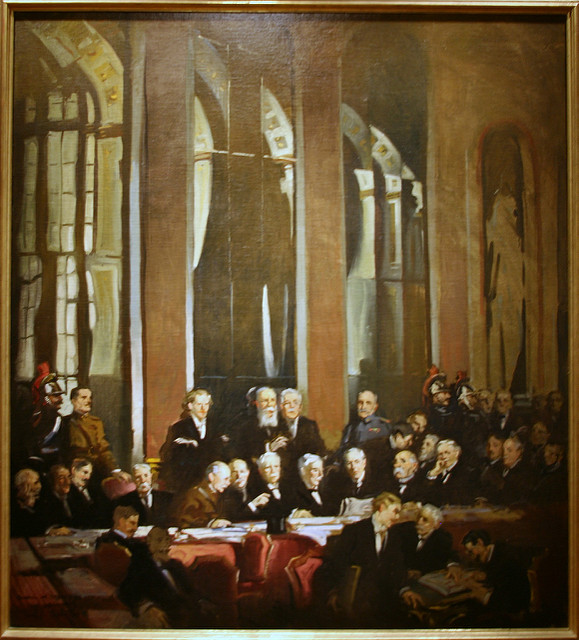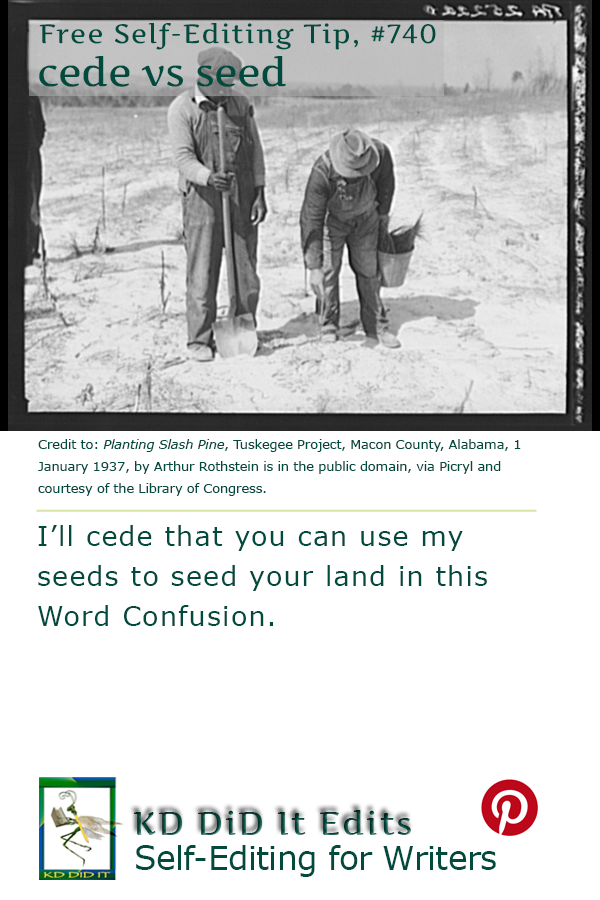Revised as of
5 Sept 2022
It was when this character “seeded her rights to control her recipes” that I moaned…and not in a good way.
Now if she’d ceded her rights, I’d’ve gone on, blithely reading this cozy mystery romance about a cook.
So, remember, to cede is to give up, yield, grant something to another.
Now, to seed has a lot more possibilities. Hmmm, although it does seem rather limited to one activity in romance novels. Still, seeds do help feed the soul.
You may want to explore the post “Seat vs Seed” as well.
Word Confusions . . .
. . . started as my way of dealing with a professional frustration with properly spelled words that were out of context in manuscripts I was editing as well as books I was reviewing. It evolved into a sharing of information with y’all. I’m hoping you’ll share with us words that have been a bête noire for you from either end.
If you found this post on “Cede versus Seed” interesting, consider tweeting it to your friends. Subscribe to KD Did It, if you’d like to track this post for future updates.
| Cede | Seed |
|---|---|

Signing of the Treaty of Versailles, 1919, by Cliff is under the CC BY 2.0 license, via Flickr. — Germany was forced to cede Alsace-Lorraine to France. |

Brown Flax Seeds by Sanjay Acharya is under the CC BY-SA 3.0 or GFDL license, via Wikimedia Commons. |
| Part of Grammar: | |
| Verb, intransitive & transitive
Third person present verb: cedes |
Noun; Verb, intransitive & transitive
Plural for the noun and third person present verb: seeds |
| Verb, intransitive: To yield or grant Verb, transitive: To yield or formally surrender to another |
Noun: A flowering plant’s unit of reproduction, capable of developing into another such plant
A man’s semen
Any of a number of stronger competitors in a sports tournament who have been assigned a specified position in an ordered list with the aim of ensuring that they do not play each other in the early rounds [Also seed crystal] A small crystal introduced into a liquid to act as a nucleus for crystallization A small container for radioactive material placed in body tissue during radiotherapy Verb, intransitive:
Verb, transitive:
Remove the seeds from vegetables or fruit [With complement] Give (a competitor) the status of seed in a tournament |
| Examples: | |
| Verb, intransitive: The lands were ceded by treaty. Insurers can share a portion of their risks, up to 10 percent of their book of business, and each insurer chooses which risks to cede. Verb, transitive: Trump’s actions may well cede power to the Democrats. The Hawks ceded the game to the Bravos. At the end of World War II, Italy had to cede all islands in the eastern Adriatic. |
Noun: California poppies seed themselves so easily. Kentucky blue grass is a popular grass seed. Did you know you can grow artichokes from seed? The conversation sowed a tiny seed of doubt in his mind. He spilled his seed everywhere. Mark knows he has allowed himself to go to seed. “Seeds are the sons of the Kingdom and that the tears are the sons of the wicked one (Matthew 13.38). He knocked the top seed out of the championships. You can easily grow a large crystal if you start with a seed crystal. “When your doctor puts very small radioactive metal seeds into your prostate gland, the seeds slowly release a low level of radiation into the area of the prostate over 6 to 12 months (Cancer Research UK). Verb, intransitive: Feverfew will seed itself readily. Verb, transitive: John was careful to seed only with non-GMO seeds in his fields. Severance payouts will help seed their new businesses. They plan to seed the clouds and induce rain. First, stem and seed the chilies. Jeff Tarango, seeded five, was defeated by fellow American Todd Witsken. |
| Derivatives: | |
| Adjective: unceded Noun: ceder |
Adjective: seeded, seedier, seediest, seedless, seedy Adverb: seedily Noun: seed-lip, seedbed, seedeater, seeder, seediness, seedling, seedpod, seedsman |
| History of the Word: | |
| Early 16th century, from the French céder or the Latin cedere meaning to yield. | Old English sǣd is of Germanic origin and related to the Dutch zaad and the German Saat, also to the verb sow. |
C’mon, get it out of your system, bitch, whine, moan . . . which words are your pet peeves? Also, please note that I try to be as accurate as I can, but mistakes happen or I miss something. Email me if you find errors, so I can fix them . . . and we’ll all benefit!
Satisfy your curiosity about other Word Confusions on its homepage or more generally explore the index of self-editing posts. You may also want to explore Book Layout & Formatting Ideas, Formatting Tips, Grammar Explanations, Linguistics, Publishing Tips, the Properly Punctuated, Writing Ideas and Resources, and Working Your Website.
Resources for Cede versus Seed
Apple Dictionary.com
Collins English Dictionary: cede
Pinterest Photo Credits:
Planting Slash Pine, Tuskegee Project, Macon County, Alabama, 1 January 1937, by Arthur Rothstein is in the public domain, via Picryl, and courtesy of the Library of Congress.


